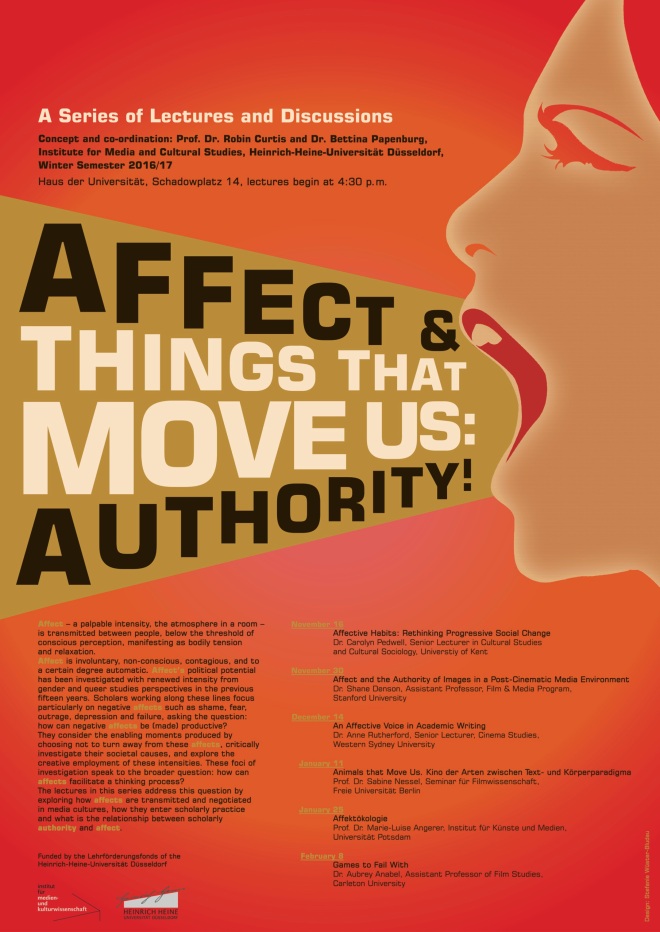
I am honored to be participating in this lecture series at the Heinrich-Heine-Universität Düsseldorf. My talk, titled “Affect and the Authority of Images in a Post-Cinematic Media Environment,” will take place on November 30.

I am honored to be participating in this lecture series at the Heinrich-Heine-Universität Düsseldorf. My talk, titled “Affect and the Authority of Images in a Post-Cinematic Media Environment,” will take place on November 30.
I am pleased to announce that Post-Cinema: Theorizing 21st-Century Film, which I co-edited with Julia Leyda, is now available for download in PDF format.
The open-access book, which has been available in an online HTML version since earlier this year, weighs in at a whopping 990 pages (!) and can now be downloaded for offline reading in two versions (9mb or a higher-quality 13mb version).
There are also two new endorsements for the book. First, from Tanya Horeck at Anglia Ruskin University:
Post-Cinema: Theorizing 21st-Century Film is an intellectually exciting and important book. Editors Shane Denson and Julia Leyda have assembled an extraordinary range of notable contributors with the aim to open up a critical conversation on the very notion of the post-cinematic – something they achieve in a most novel and engaging way. Through essays and roundtable discussions, Post-Cinema formulates fresh and nuanced questions about the consumption and spectatorship of post-millennial film and other media as they circulate through contemporary digital media ecologies. As is fitting given its subject matter of changing media formats, the design and layout of this book – with its open access digitality and its collaborative dialogues – is as relevant and pioneering as its content. Inviting us to rethink received ideas about how 21st-century media reshape “new forms of sensibility,” Post-Cinema: Theorizing 21st-Century Film is critically imperative reading for anyone interested in ongoing vital transformations in moving image media.
– Tanya Horeck, Reader in Film, Media, and Culture, Anglia Ruskin University
And also an endorsement from Michael Lawrence at University of Sussex:
The essays and discussions that have been assembled in Post-Cinema: Theorizing 21st–Century Film provide the reader with a remarkably comprehensive and compelling survey of the diverse critical and theoretical responses to the formal, technological, affective, political and ecological dimensions of our contemporary post-cinematic landscape. That landscape now has an authoritative and inspirational field guide: by gathering together foundational interventions alongside the most recent contributions this collection will prove indispensable to anyone wishing to take these conversations forward.
– Michael Lawrence, Reader in Film Studies, University of Sussex
More info and an official announcement can be found here.
Above you’ll find the video of my talk, “Digital Seriality: Code & Community in the Super Mario Modding Scene,” which I delivered on September 27, 2016 as part of the Interactive Media & Games Seminar Series at Stanford University.
Here is the abstract for my talk:
Digital Seriality: Code & Community in the Super Mario Modding Scene
Shane Denson
Seriality is a common feature of game franchises, with their various sequels, spin-offs, and other forms of continuation; such serialization informs social processes of community-building among fans, while it also takes place at much lower levels in the repetition and variation that characterizes a series of game levels, for example, or in the modularized and recycled code of game engines. This presentation considers how tools and methods of digital humanities — including “distant reading” and visualization techniques — can shed light on serialization processes in digital games and gaming communities. The vibrant “modding” scene that has arisen around the classic Nintendo game Super Mario Bros. (1985) serves as a case study. Automated “reading” techniques allow us to survey a large collection of fan-based game modifications, while visualization software helps to bridge the gap between code and community, revealing otherwise invisible connections and patterns of seriality.